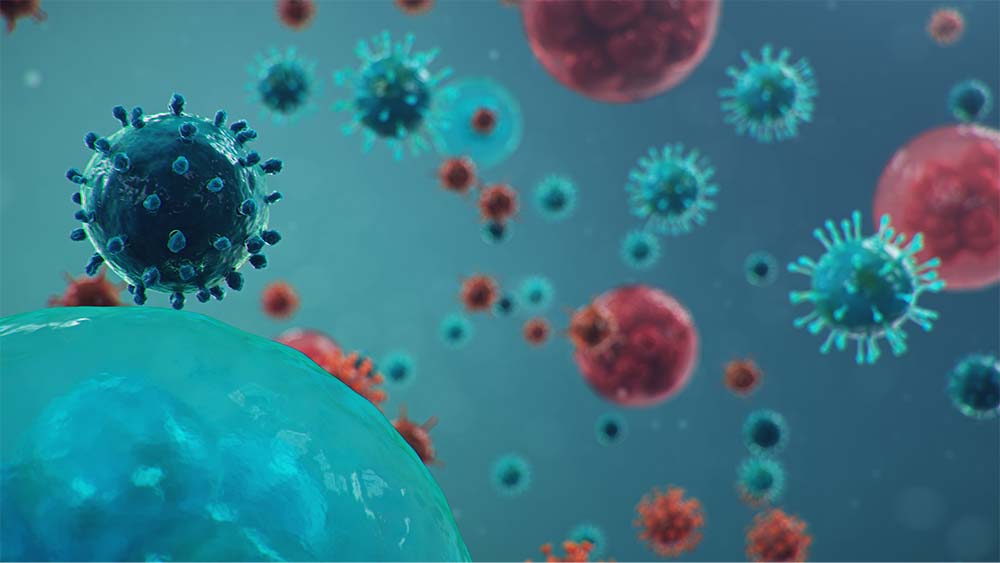
Researchers have discovered 12 immune-related proteins that are associated with an increased risk of death from COVID-19.

Researchers have discovered 12 immune-related proteins that are associated with an increased risk of death from COVID-19.
What you need to know
When a virus like SARS-CoV-2 enters your body, your immune system responds by making antibodies and proteins to protect you. A strong immune response can help keep you healthy. But when that response is too strong, it can hurt your body, leading to dangerous levels of inflammation. NIH-supported research has linked higher levels of certain immune proteins with a greater risk of death from COVID-19.
What did the researchers do?
Scientists at the Frederick National Laboratory for Cancer Research (FNL) and the National Institute of Allergy and Infectious Diseases (NIAID) are working together to reveal the complexities of immune responses to COVID-19.
Researchers looked at blood samples from 175 people with COVID-19, with cases ranging from mild to severe. They also examined blood samples from healthy volunteers. The researchers analyzed more than 1,400 samples in all, looking at cells and proteins in the volunteers’ blood that could serve as biomarkers (biological indicators) of severe COVID-19. They found that higher levels of 12 immune-related proteins were associated with severe disease and death. This may mean that certain kinds of immune responses can increase a person’s risk of dying from COVID-19.
The next step will be performing the same analysis on different sets of samples, including samples from children with a condition called multisystem inflammatory syndrome in children (MIS-C), to see if the same proteins are present. Researchers are also planning to look at samples from the lungs and plasma of people with COVID-19.
Why is this research important?
COVID-19 is difficult to treat because it affects people very differently. Some people have only mild symptoms or no symptoms at all, while other people get very sick and may die. Understanding why this happens may help doctors predict which cases of COVID-19 could become severe and help them provide the right treatment at the right time to reduce the risk of severe sickness and/or death.
Where can I go to learn more?
Biomarker analysis reveals clues to COVID-19 disease severity
-
FNL explains the researchers’ COVID-19 biomarker findings.
Calming an Overactive Immune System
-
Researchers are examining whether treatments called immune modulators can help COVID-19 patients with overactive immune responses.
-
NIAID is conducting research on immune responses during COVID-19 infection.
Sources
Abers, M. S., Delmonte, O. M., Ricotta, E. E., Fintzi, J., Fink, D. L., de Jesus, A., Zarember, K. A., Alehashemi, S., Oikonomou, V., Desai, J. V., Canna, S. W., Shakoory, B., Dobbs, K., Imberti, L., Sottini, A., Quiros-Roldan, E., Castelli, F., Rossi, C., Brugnoni, D., Biondi, A.,…Notarangelo, L. D. (2021). An immune-based biomarker signature is associated with mortality in COVID-19 patients. JCI Insight, 6(1), e144455. https://doi.org/10.1172/jci.insight.144455
Liu, C., Martins, A. J., Lau, W. W., Rachmaninoff, N., Chen, J., Imberti, L., Mostaghimi, D., Fink, D. L., Burbelo, P. D., Dobbs, K., Delmonte, O. M., Bansal, N., Failla, L., Sottini, A., Quiros-Roldan, E., Han, K. L., Sellers, B. A., Cheung, F., Sparks, R., Chun, T. W.,…Tsang, J. S. (2021). Time-resolved systems immunology reveals a late juncture linked to fatal COVID-19. Cell, 184(7), 1836–1857.e22. https://doi.org/10.1016/j.cell.2021.02.018

News and Stories
Read stories about the efforts underway to prevent, detect, and treat COVID-19 and its effects on our health.
 An official website of the United States government
An official website of the United States government

